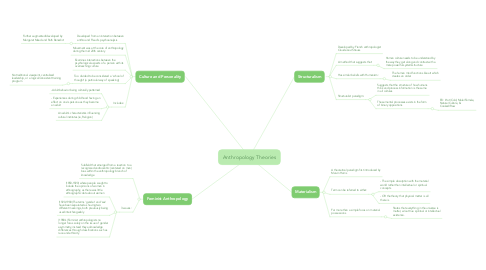
1. Culture and Personality
1.1. Developed from an interaction between anthro and Freud's psychoanalysis
1.1.1. Further augmented/developed by Margaret Mead and Ruth Benedict
1.2. Movement was at the core of anthropology during the mid 20th century
1.3. Examines interactions between the psychological aspects of a person with its overreaching culture
1.4. Too divided to be considered a 'school of thought' (a particular way of speaking)
1.4.1. No traditional viewpoint, centralized leadership, or a logical/consistent training program
1.5. Includes:
1.5.1. -Adult behavior being culturally patterned
1.5.2. - Experiences during childhood having an effect on one's persona as they become an adult
1.5.3. An adult's characteristics influencing cultural institutes (ie, Religion)
2. Feminist Anthropology
2.1. Subfield that emerged from a reaction to a recognized androcentric (centered on men) bias within the anthropology branch of knowledge
2.2. 3 waves:
2.2.1. (1850-1920) where people sought to include the opinions of women in ethnography, as there was little ethnographic data about women
2.2.2. (1920-1980) The terms 'gender' and 'sex' have been separated as having two different meanings, both previously being used interchangeably
2.2.3. (1980's) Feminist anthropologists no longer focus solely on the issue of gender asymmetry, instead they acknowledge differences through classifications such as race and ethnicity
3. Structuralism
3.1. Developed by French anthropologist Claude Lévi Strauss
3.2. A method that suggests that:
3.2.1. Human culture needs to be understood by the way they get along and contrast with a more powerful system/structure
3.3. Has similar beliefs with Humanism:
3.3.1. The human mind functions like art which creates an order
3.4. Structuralist paradigm:
3.4.1. Suggests that the structure of how humans think and process information is the same in all cultures
3.4.2. These mental processes exists in the form of binary oppositions
3.4.2.1. EX: -Hot/Cold, Male/Female, Nature/Culture, & Cooked/Raw
4. Materialism
4.1. A theoretical paradigm first introduced by Marvin Harris
4.2. Term can be referred to either:
4.2.1. - The simple absorption with the material world rather than intellectual or spiritual concepts
4.2.2. - OR the theory that physical matter is all there is
4.3. Far more than a simple focus on material possessions
4.3.1. States that everything in the universe is matter, w/out true spiritual or intellectual existence.

